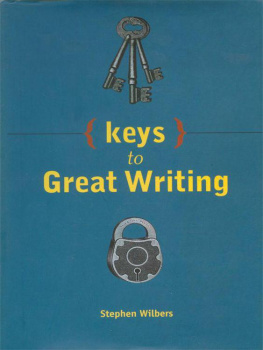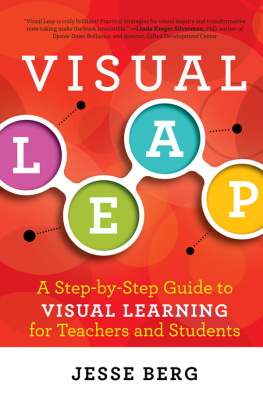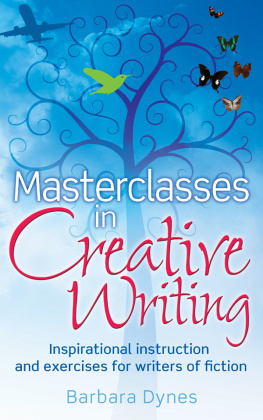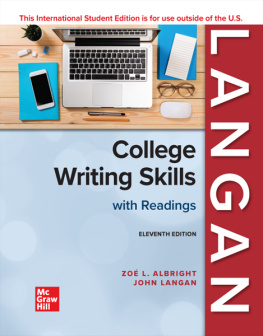Wilbers - Keys to great writing
Here you can read online Wilbers - Keys to great writing full text of the book (entire story) in english for free. Download pdf and epub, get meaning, cover and reviews about this ebook. City: Cincinnati, Ohio, year: 2000, publisher: Writer’s Digest Books, genre: Home and family. Description of the work, (preface) as well as reviews are available. Best literature library LitArk.com created for fans of good reading and offers a wide selection of genres:
Romance novel
Science fiction
Adventure
Detective
Science
History
Home and family
Prose
Art
Politics
Computer
Non-fiction
Religion
Business
Children
Humor
Choose a favorite category and find really read worthwhile books. Enjoy immersion in the world of imagination, feel the emotions of the characters or learn something new for yourself, make an fascinating discovery.
- Book:Keys to great writing
- Author:
- Publisher:Writer’s Digest Books
- Genre:
- Year:2000
- City:Cincinnati, Ohio
- Rating:4 / 5
- Favourites:Add to favourites
- Your mark:
- 80
- 1
- 2
- 3
- 4
- 5
Keys to great writing: summary, description and annotation
We offer to read an annotation, description, summary or preface (depends on what the author of the book "Keys to great writing" wrote himself). If you haven't found the necessary information about the book — write in the comments, we will try to find it.
Wilbers: author's other books
Who wrote Keys to great writing? Find out the surname, the name of the author of the book and a list of all author's works by series.
Keys to great writing — read online for free the complete book (whole text) full work
Below is the text of the book, divided by pages. System saving the place of the last page read, allows you to conveniently read the book "Keys to great writing" online for free, without having to search again every time where you left off. Put a bookmark, and you can go to the page where you finished reading at any time.
Font size:
Interval:
Bookmark:

{keys} to Great Writing

Stephen Wilbers

WRITER'S DIGEST BOOKS
CINCINNATI, OHIO
www.writersdigest.com
Keys to Great Writing . Copyright 2000 by Stephen Wilbers. Manufactured in the United States of America. All rights reserved. No part of this book may be reproduced in any form or by any electronic or mechanical means including information storage and retrieval systems without permission in writing from the publisher, except by a reviewer, who may quote brief passages in a review. Published by Writer's Digest Books, an imprint of F&W Publications, Inc., 1507 Dana Avenue, Cincinnati, Ohio 45207. (800) 289-0963. First edition.
Visit our Web site at www.writersdigest.com for information on more resources for writers.
To receive a free weekly E-mail newsletter delivering tips and updates about writing and about Writer's Digest products, send an E-mail with Subscribe Newsletter in the body of the message to newsletter-request@writersdigest.com, or register directly at our Web site at www.writersdigest.com.
04 03 02 01 00 5 4 3 2 1
Library of Congress Cataloging-in-Publication Data
Wilbers, Stephen
Keys to great writing / by Stephen Wilbers.
p. cm.
Includes bibliographical references.
ISBN 0-89879-932-5 (hc : alk. paper)
1. English languageRhetoricHandbooks, manuals, etc. 2. English languageGrammarHandbooks, manuals, etc. I. Title.
PE1408.W58198 2000
808'.042dc21 00-042302
CIP
Edited by Jack Heffron and Michelle Howry
Designed by Sandy Conopeotis Kent
Cover designed by Matthew Gaynor
Production coordinated by Sara Dumford
Harlem from Collected Poems by Langston Hughes. Copyright 1994 by the Estate of Langston Hughes. Reprinted by permission of Alfred A. Knopf, a Division of Random House.
Portions of this book have been published previously in The College Board Review , the Minneapolis Star and Tribune , and in two self-published collections of columns: Writing for Business (The Good Writing Press, 1993) and Writing With Wilbers (The Good Writing Press, 1995).
{Acknowledgments}
Every writer needs a good editor, and I have been fortunate to have the able assistance of Steve Blake, Madeline Hamermesh, Sally Lederer, and Susan Peterson in writing and revising an early draft of this book. I want to express particular appreciation to Steve Blake, who offered encouragement and insight during our many pleasant runs along the Minnehaha Creek and around Lake Harriet, and to Susan Peterson, who edits my column for the Minneapolis Star Tribune , whose care and dedication to her craft are an inspiration, and who has never once yelled at me for missing a deadline. I also want to offer special thanks to my wife's mother Dorothy, whose pride I take pride in, and to my wife Debbie and children Eddy and Kate, whose love and support are always with me.
{Dedication}
To my parents, Larry Wilbers and Margaret Stevens
{About the Author}

Stephen Wilbers is a writing consultant, syndicated columnist, and award-winning author. He teaches at the University of Minnesota and at Hamline University, where he won a 1995 Outstanding Faculty Award. Since December 1991, he has written a weekly column on effective writing, which appears in the Minneapolis Star Tribune and other newspapers. He has published two collections of his columns, Writing for Business (winner of a 1994 Minnesota Book Award) and Writing by Wilbers . For his Ph.D. dissertation he wrote a history of the Iowa Writers' Workshop, which was published by the University of Iowa Press.
Steve was born in Cincinnati, Ohio. He earned his B.A. at Vanderbilt University, and his M.A. and Ph.D. at the University of Iowa. He spent his junior year abroad in Aix-en-Provence, where he fell in love with the French language and the Cours Mirabeau. As a 1985 Visiting Fulbright Fellow at the University of Essex, he lived for five months in Wivenhoe, England, accompanied by his wife, Debbie, and two young children, Eddy and Kate. He and his wife now live in Minneapolis, which affords him easy access to the Boundary Waters Canoe Area Wilderness of northern Minnesota, where he and his fatheralong with various family members and friendshave taken annual canoe trips for the past twenty-two years. At the University of Minnesota, he directed one of the largest student academic support services operations in the country before serving as Associate Director of the Program in Creative and Professional Writing. Since 1990, he has worked full time as a student and teacher of writing.
For sample columns, writing exercises, and links to writing resources on the Internet, visit his Web page at www.wilbers.com .
{Table of Contents}
{Foreword}
What are the keys to great writing?
In my work as a part-time college professor, writing consultant, and newspaper columnist, I am often asked that question. Not always in those words, but in words to that effect. How do I make my writing vivid and memorable? How do I set myself apart from other writers? How do I convey my personality, my point of view, my values? How do I learn to write with style?
Taking the last question first, I suggest that you do three things: read, study, and practice. Read good writers, study specific stylistic techniques, and practice applying those techniques. The first activity, reading, will help you develop your style over time (and offer you other immeasurable benefits and pleasures along the way). The other two activities, study and practice, are more intentional, self-conscious endeavors. They involve analyzing and imitating proven techniques to produce predictable results.
As many authors before me have said, to develop your style, begin with simplicity. The nineteenth-century English critic and essayist Matthew Arnold declared: People think I can teach them style. What stuff it is. Have something to say and say it as clearly as you can. That is the only secret of style.
Say what you have to say. Say it simply and directly. To improve your style, begin by reducing your writing to its essential elements. Then build. Finallywith caution and at some riskembellish. Add flourish if it suits you (and if it suits your audience and subject), keeping in mind that flourish is not the same as fluff. Even as you attempt elegance, your principal goal should be clarity.
In The Elements of Style , William Strunk and E. B. White warn against all mannerisms, tricks, adornments. They advise the writer to approach style by way of plainness, simplicity, orderliness, sincerity. In On Writing Well , William Zinsser says, you have to strip down your writing before you can build it back up, and he offers his own cardinal goals of good writing: humanity, clarity, simplicity, vitality. In Style: Ten Lessons in Clarity and Grace , Joseph Williams includes a cluster of techniques for writing concisely as one of his ten lessons. Those three books, read and studied by countless writers, form the foundation for this book, and I want to acknowledge my debt to them, as well as to the many other sources I cite throughout my text.
In this book, I present five keys to great writing: economy, precision, action, music, and personality. Economy involves rejecting the notion that more is necessarily better. As Strunk and White point out, economy doesn't mean that every sentence must be short, but that every word must count.
Next pageFont size:
Interval:
Bookmark:
Similar books «Keys to great writing»
Look at similar books to Keys to great writing. We have selected literature similar in name and meaning in the hope of providing readers with more options to find new, interesting, not yet read works.
Discussion, reviews of the book Keys to great writing and just readers' own opinions. Leave your comments, write what you think about the work, its meaning or the main characters. Specify what exactly you liked and what you didn't like, and why you think so.








